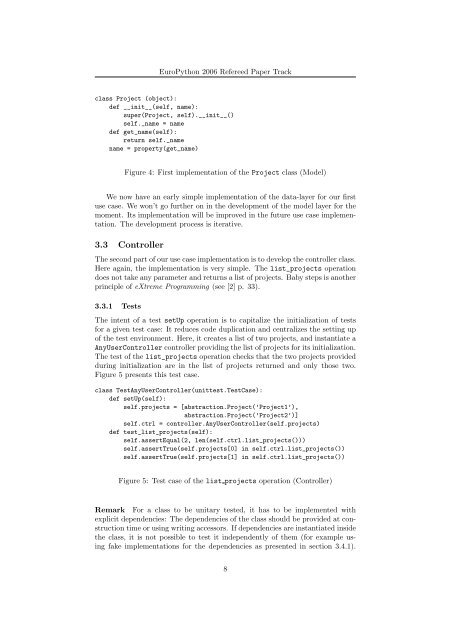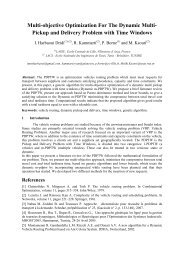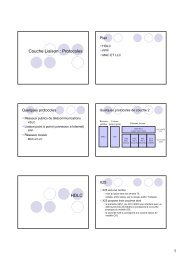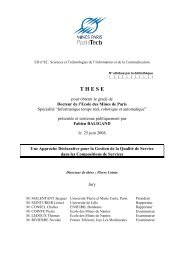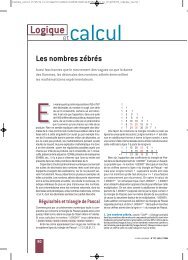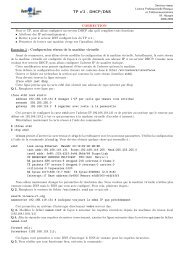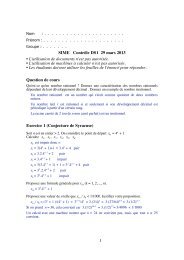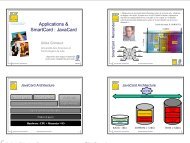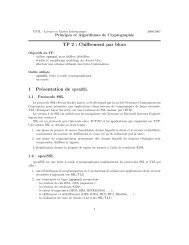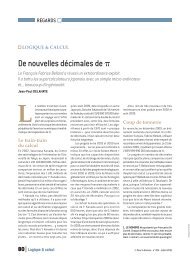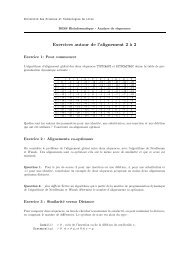An Introduction to Test-Driven Code Generation - LIFL
An Introduction to Test-Driven Code Generation - LIFL
An Introduction to Test-Driven Code Generation - LIFL
You also want an ePaper? Increase the reach of your titles
YUMPU automatically turns print PDFs into web optimized ePapers that Google loves.
EuroPython 2006 Refereed Paper Track<br />
class Project (object):<br />
def __init__(self, name):<br />
super(Project, self).__init__()<br />
self._name = name<br />
def get_name(self):<br />
return self._name<br />
name = property(get_name)<br />
Figure 4: First implementation of the Project class (Model)<br />
We now have an early simple implementation of the data-layer for our first<br />
use case. We won’t go further on in the development of the model layer for the<br />
moment. Its implementation will be improved in the future use case implementation.<br />
The development process is iterative.<br />
3.3 Controller<br />
The second part of our use case implementation is <strong>to</strong> develop the controller class.<br />
Here again, the implementation is very simple. The list_projects operation<br />
does not take any parameter and returns a list of projects. Baby steps is another<br />
principle of eXtreme Programming (see [2] p. 33).<br />
3.3.1 <strong>Test</strong>s<br />
The intent of a test setUp operation is <strong>to</strong> capitalize the initialization of tests<br />
for a given test case: It reduces code duplication and centralizes the setting up<br />
of the test environment. Here, it creates a list of two projects, and instantiate a<br />
<strong>An</strong>yUserController controller providing the list of projects for its initialization.<br />
The test of the list_projects operation checks that the two projects provided<br />
during initialization are in the list of projects returned and only those two.<br />
Figure 5 presents this test case.<br />
class <strong>Test</strong><strong>An</strong>yUserController(unittest.<strong>Test</strong>Case):<br />
def setUp(self):<br />
self.projects = [abstraction.Project(’Project1’),<br />
abstraction.Project(’Project2’)]<br />
self.ctrl = controller.<strong>An</strong>yUserController(self.projects)<br />
def test_list_projects(self):<br />
self.assertEqual(2, len(self.ctrl.list_projects()))<br />
self.assertTrue(self.projects[0] in self.ctrl.list_projects())<br />
self.assertTrue(self.projects[1] in self.ctrl.list_projects())<br />
Figure 5: <strong>Test</strong> case of the list projects operation (Controller)<br />
Remark For a class <strong>to</strong> be unitary tested, it has <strong>to</strong> be implemented with<br />
explicit dependencies: The dependencies of the class should be provided at construction<br />
time or using writing accessors. If dependencies are instantiated inside<br />
the class, it is not possible <strong>to</strong> test it independently of them (for example using<br />
fake implementations for the dependencies as presented in section 3.4.1).<br />
8


